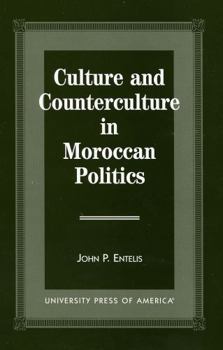Culture and Counterculture in Moroccan Politics
Select Format
Select Condition 
Book Overview
Culture and politics in Morocco are an interactive blend of conflict and congruence. John P. Entelis argues that no single form defines Morocco's national identity and identifies four cultural patterns-monarchial, modernist, militarist, and messianic-that compete with each other yet share strong ties to an overriding cultural core of 'Muslim consensus'. This consensus explains much of the country's success in reconciling cultural differences in a relatively nonviolent manner and in creating a pluralistic, open and populist society. Entelis argues that Morocco, at a critical juncture in its postindependence history, may be able to overcome challenges from international pressures and socioeconomic problems because of its cultural harmony. Previously published in 1989 by Westview Press.
Format:Paperback
Language:English
ISBN:0761803920
ISBN13:9780761803928
Release Date:August 1996
Publisher:University Press of America
Length:164 Pages
Customer Reviews
1 rating
Counter Cultures
Published by Thriftbooks.com User , 20 years ago
Entelis presents an analysis of the political side of Moroccan culture that is filled with excellent insights. I found that it dove-tailed with my experiences here, and I could agree with his general points. This is a culture with many different cultures in it, or as the Saharawi of the South call it, "The Land of Many Peoples". It is a place filled with constant cultural contradiction- and somehow they make it work. What we in the West might call Schizophrenia, they call normality, and can approach life constantly code switching. One moment the conversation is about business and in French, the next moment about relationships and in Arabic, and the next moment a special mixture of Arabic and French as they talk about where they will go on vacation. Style and stance change as they talk. While I could agree with Entelis on his ideas, I found his theoretical synthesis of the culture very cogent and helpful. I had not considered these aspects in this manner before, and found he brought everything together in a new way that helped me make greater sense of the environment here. I also saw some new ways that I can relate better to Moroccans by acting more as they act. While his organization could be a little stronger, allowing for a clearer understanding of his sub and final points, the book as a whole gives a very clear presentation of why Morocco is ahead of other Arab and African countries in many ways. The king uses Islam, Arab culture, and Moroccan cultural symbols constantly to encourage his authority and power, and this synthesis is very aptly maintained. While Entelis proposes a few segments of society that could possibly be dangers to the kingdom, he rightfully states that none of these pose a real threat, as no other segment of the society can use as expertly all three symbols that the Moroccan people look to.






